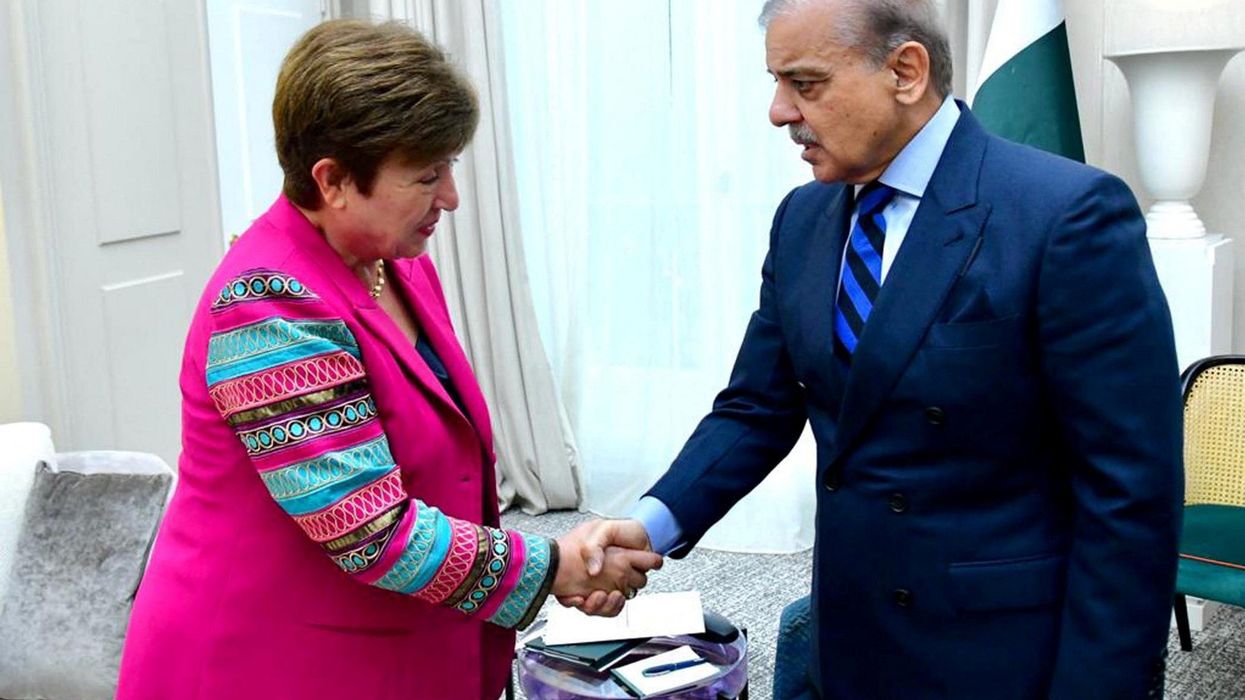In a much-needed relief for the Pakistani economy, the country successfully obtained a crucial $3 billion short-term financial package from the International Monetary Fund (IMF) on Friday (30).
The agreement between Pakistan and the IMF has been reached, and it is now awaiting approval by the IMF board in July.
This financial assistance comes at a critical time as Pakistan faces the imminent risk of default, offering a momentary reprieve and stability to the south Asian nation.
Just hours before the expiration of the existing IMF agreement, Pakistan managed to secure a new nine-month standby arrangement, bringing much-needed relief to the country's severe balance of payments crisis.
Prime minister Shehbaz Sharif expressed confidence that this arrangement would set Pakistan on the trajectory of sustainable economic growth.
Given the soaring inflation rates and foreign exchange reserves that could barely cover a month's worth of imports, analysts warn that Pakistan's economic crisis could have escalated into a full-fledged debt default if not for the timely bailout.
It was reached only after Sharif held marathon meetings with IMF head Kristalina Georgieva on June 22, which he termed "a turning point".
Pakistan will receive formal documents on the deal later on Friday, finance minister Ishaq Dar told Reuters, which he said he would "sign, seal and return by tonight".
The new deal, which came hours after Dar told Reuters exclusively that it could happen anytime, will disburse an upfront amount of $1.1 billion shortly after the IMF board's meeting in July, he said.
Dar said Pakistan aimed to boost the central bank's foreign exchange reserves up to $15 billion by July end. "We have stopped the decline, now we have to turn to growth," he added.
Pakistan's sovereign dollar bonds were trading higher after the announcement, with the 2024 issue enjoying the biggest gains, up more than 8 cents at just above 70 cents in the dollar, according to Tradeweb data.
The gains were most pronounced in shorter-dated bonds, reflecting lingering scepticism over the longer-term fiscal outlook for the country.
The $3 billion short-term IMF funding is higher than expected as it looks set to replace the remaining $2.5 billion from a $6.5 billion Extended Fund Facility agreed in 2019.
"This new programme is far better than our expectations," said Mohammed Sohail of Topline Securities in Karachi, adding it would "definitely help restore some investor confidence".
The deal will also unlock other bilateral and multilateral financing. Long-time allies Saudi Arabia, the UAE and China have already pledged or rolled over billions of dollars in loans.
"This will support near-term policy efforts and replenish gross reserves," the IMF said.
Power price hikes
The new arrangement builds on the 2019 programme, IMF official Nathan Porter said in a statement, adding that Pakistan's economy had faced several challenges in recent times, including devastating floods and rising commodity prices.
"Despite the authorities' efforts to reduce imports and the trade deficit, reserves have declined to very low levels. Liquidity conditions in the power sector also remain acute," Porter said.
"Given these challenges, the new arrangement would provide a policy anchor and a framework for financial support from multilateral and bilateral partners in the period ahead."
Porter also pointed out the power sector's buildup of arrears and frequent power outages.
Reforms in the energy sector, which has accumulated nearly 3.6 trillion Pakistani rupees ($12.58 billion) in debt, has been a cornerstone of the IMF talks.
The IMF said it would want steadfast policy implementation by Pakistan to overcome challenges, "particularly in the energy sector", where it expects a rise in electricity prices.
Dar said the hike will come before the IMF board's meeting, saying the rebasing to be done in July will make about three to four rupees a unit difference.
He also said petroleum levy will be capped at 60 rupee a litre.
He announced a 7.5 rupee a litre increase in diesel prices late Friday night, saying petrol prices will remain unchanged for next 15 days.
"Reform does not, must not, mean raising tariff endlessly," said Pakistan's minister for power Khurram Dastgir.
With the tenure of the current government ending in August, Dastgir said it had put in place an "aggressive medium-to-long-term plan" to increase renewable energy which was only possible if long-term assistance is available.
Painful reforms
Islamabad has taken a slew of measures demanded by the IMF since its mission arrived in Pakistan in February, including revising its 2023-24 budget and a policy rate hike to 22% in recent days.
It also got Pakistan to raise more than 385 billion rupee ($1.34 billion) in new taxation to meet the IMF's fiscal adjustments.
The IMF said the central bank should remain pro-active to reduce inflation and maintain a foreign exchange framework.
The painful adjustments have already fuelled all time high inflation of 38% year-on-year in May, the highest in Asia.
"The FY24 budget advances a primary surplus of around 0.4 percent of GDP," Porter said, adding it will be important that the budget is executed as planned, and authorities resist pressures for un-budgeted spending or tax exemptions.
(Reuters)




